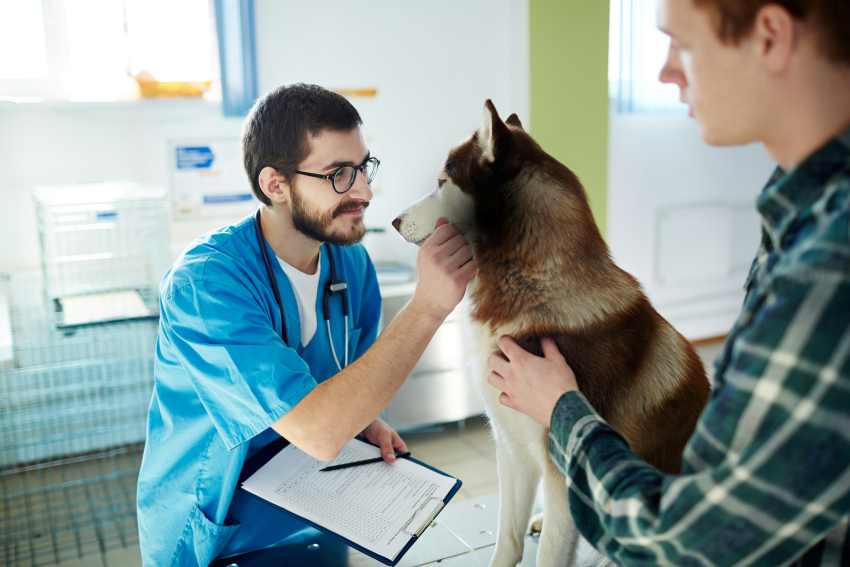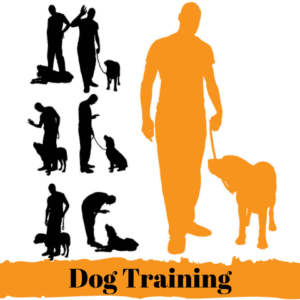When it comes to our beloved furry companions, ensuring their well-being is a top priority. From regular vet check-ups to providing a balanced diet, pet owners strive to keep their dogs happy and healthy.
However, despite our best efforts, there are certain risks that we need to be aware of, one of which is food poisoning. Just like humans, dogs can also suffer from food poisoning, and understanding the causes, symptoms, and preventive measures is crucial in safeguarding their health.
In this comprehensive guide, we answer the question Can Dogs Get Food Poisoning, shedding light on everything you need to know to keep your canine companion safe.
What is Food Poisoning in Dogs?
Food poisoning, also known as gastroenteritis, is a condition that occurs when dogs consume contaminated or spoiled food or water. This can lead to gastrointestinal distress and various symptoms that range from mild to severe, depending on the type and amount of toxic substance ingested.
Causes of Food Poisoning in Dogs:
Bacterial Contamination:
Bacteria such as Salmonella, E. coli, and Campylobacter are common culprits of dog food poisoning. These bacteria can be present in raw meat, unpasteurized dairy products, and certain fruits and vegetables.
Toxic Foods:
Certain human foods, such as chocolate, grapes, onions, garlic, and xylitol (a sugar substitute), are poisonous to dogs and can cause gastrointestinal problems if ingested.
Spoiled Food:
Consuming spoiled food or going bad can also lead to food poisoning in dogs.
Food Allergies:
Some dogs may be allergic to certain ingredients in their food, leading to digestive issues and symptoms resembling food poisoning.
Related articles:
Is Chocolate Poisonous to Dogs | Signs Your Dog Has Eaten Chocolate
What Foods Are Toxic To Dogs
Symptoms of Food Poisoning in Dogs:
Identifying the symptoms of food poisoning in dogs is crucial for prompt treatment. Common signs include:
- Vomiting and diarrhea
- Abdominal pain or discomfort
- Loss of appetite
- Lethargy or weakness
- Dehydration
- Fever
- Blood in stool
Treatment and Prevention:
If you suspect that your dog has food poisoning, it’s essential to seek veterinary care immediately. Treatment may involve fluid therapy to address dehydration, medications to alleviate symptoms such as vomiting and diarrhea, and supportive care to help your dog recover.
Find a veterinarian near you (America only) VetSpecialists.com
Preventing food poisoning in dogs requires diligence and awareness. Here are some preventive measures:
Feed a Balanced Diet:
Ensure your dog’s diet is nutritionally balanced and free from toxic foods.
Proper Food Handling:
Practice appropriate food handling and storage to prevent bacterial contamination.
Avoid Table Scraps:
Refrain from feeding your dog table scraps, especially foods that are toxic to dogs.
Regular Vet Check-ups:
Schedule regular veterinary check-ups to monitor your dog’s health and discuss dietary concerns.
Monitor Symptoms: Be vigilant for any signs of gastrointestinal distress in your dog and seek veterinary attention if necessary.
Food poisoning is a serious concern for dog owners, but with proper knowledge and preventive measures, you can minimize the risk to your furry friend. By understanding the causes, symptoms, and preventative strategies outlined in this guide, you can take proactive steps to keep your dog safe and healthy.
Remember, your dog’s well-being is in your hands, so prioritize their nutrition and health to ensure a happy and fulfilling life together.

Treating Food Poisoning in Dogs Safely and Effectively
Treating a dog for food poisoning requires prompt veterinary attention. It may involve a combination of supportive care and medical intervention tailored to the symptoms’ severity and the poisoning’s specific cause. Here’s a detailed elaboration on how to treat a dog for food poisoning:
Veterinary Examination:
Upon suspecting food poisoning in your dog, the first step is to seek veterinary care immediately. A thorough physical examination by a veterinarian is essential to assess the dog’s condition and determine the appropriate course of treatment.
Fluid Therapy:
Dehydration is a common complication of food poisoning in dogs, mainly if vomiting and diarrhea occur. Fluid therapy, which involves administering fluids intravenously or subcutaneously, may be necessary to restore hydration levels and maintain electrolyte balance.
Medications:
Depending on the symptoms and severity of the food poisoning, your veterinarian may prescribe medications to alleviate gastrointestinal distress and manage other symptoms. These medications may include:
- Antiemetics: to control vomiting
- Antidiarrheals: to manage diarrhea
- Gastrointestinal protectants: to soothe the stomach lining and reduce inflammation
Nutritional Support:
Sometimes, your veterinarian may recommend withholding food to allow the dog’s gastrointestinal tract to rest and recover. Once the acute symptoms have subsided, a bland diet may be gradually reintroduced to prevent further irritation. This typically consists of easily digestible foods such as boiled chicken and rice.
Monitoring and Follow-up:
After initiating treatment, it’s essential to closely monitor your dog’s condition for any signs of improvement or worsening. Follow any additional instructions your veterinarian provides, including follow-up appointments and recommendations for at-home care.
Identification and Addressing of Underlying Cause:
In addition to treating the immediate symptoms of food poisoning, it’s crucial to identify and address the underlying cause to prevent future occurrences. This may involve reviewing the dog’s diet, eliminating any potential contamination or toxicity sources, and implementing preventive measures to safeguard against future food poisoning episodes.
Emergency Situations:
In severe cases of food poisoning or if your dog exhibits symptoms such as severe vomiting, diarrhea, lethargy, or collapse, it’s considered a medical emergency and immediate veterinary intervention is necessary. These symptoms may indicate a more serious condition requiring intensive care and supportive treatment.
Home Care:
Follow any specific instructions provided by your veterinarian for at-home care, which may include administering prescribed medications, monitoring food and water intake, and observing for any changes in your dog’s condition.
I have more on Healing at Home below. Be sure to continue reading.
Prompt veterinary care is essential in treating food poisoning in dogs effectively. By providing supportive care, administering necessary medications, and addressing the underlying cause, you can help your furry companion recover and prevent future occurrences of food poisoning. Always consult your veterinarian for personalized guidance and recommendations tailored to your dog’s needs.
Healing at Home: Effective Remedies for Dogs with Food Poisoning
While it’s crucial to seek veterinary care for dogs with food poisoning, some supportive measures and home remedies may help alleviate mild symptoms and aid in the recovery process. It’s important to note that these remedies are not substitutes for professional veterinary treatment but can be used as complementary measures under the guidance of a veterinarian. Here are some home remedies for dogs with food poisoning:
Fluid Therapy:
Hydration is critical in managing food poisoning in dogs. Offer your dog plenty of fresh, clean water to drink to prevent dehydration. You can also offer electrolyte solutions designed for dogs or make a homemade version by diluting chicken or beef broth with water to encourage drinking and replenish electrolytes lost through vomiting and diarrhea.
Bland Diet:
When a dog’s digestive system is upset, a bland diet can help soothe the stomach and promote recovery. Boiled white rice and lean-boiled chicken (without seasoning or skin) are commonly recommended bland foods for dogs with gastrointestinal issues. These foods are easily digestible and provide essential nutrients while giving the digestive system a break.
Probiotics:
Probiotics are beneficial bacteria that support digestive health and can help restore the balance of gut flora disrupted by food poisoning. You can find probiotic supplements specifically formulated for dogs at pet stores or consult your veterinarian for appropriate probiotic product recommendations.
Slippery Elm Bark:
Slippery elm bark is a natural remedy known for its soothing properties on the digestive tract. It can help relieve inflammation and irritation in the stomach and intestines. You can administer slippery elm bark in the form of powder or capsules mixed with water, following the recommended dosage for your dog’s size.
Pumpkin:
Plain canned pumpkin (not pumpkin pie filling) is another home remedy to help with mild digestive upset in dogs. Pumpkin is rich in fiber and can aid in firming up loose stools caused by food poisoning. Offer your dog a small amount of canned pumpkin with meals, adjusting the portion based on your dog’s size and the severity of symptoms.
Rest and Monitoring:
Ensure your dog gets plenty of rest to allow the body to recover from food poisoning. Monitor your dog closely for any changes in symptoms, appetite, or behavior, and contact your veterinarian if symptoms worsen or if you have any concerns.
Herbal Teas:
Certain herbal teas, such as chamomile or ginger tea, may help soothe an upset stomach in dogs. Brew the tea using a small amount of dried herbs (without added sugars or artificial ingredients), let it cool, and offer it to your dog in small amounts.
Warm Compress:
A warm compress applied to your dog’s abdomen can help provide comfort and relief from abdominal discomfort associated with food poisoning. Use a warm, damp towel or a heating pad set on low heat and apply it gently to your dog’s belly for a few minutes at a time.
Caution:
While these home remedies may temporarily relieve mild cases of food poisoning, it’s essential to consult your veterinarian before administering any remedies, especially if your dog’s symptoms are severe or persistent. Also, avoid giving your dog over-the-counter medications for humans without veterinary guidance, as they can harm dogs.
Can Dogs Get Food Poisoning?
In summary, home remedies can be supportive in managing mild symptoms of food poisoning in dogs, but they should always be used under the guidance of a veterinarian. If your dog shows signs of food poisoning, seek veterinary care promptly for proper diagnosis and treatment. Your veterinarian can provide personalized recommendations and guidance based on your dog’s specific needs and condition.
Related articles:
The Lethal Threat: Why Antifreeze is Toxic to Dogs and How to Protect Your Pet
